- Andreas Ruprecht, Bernhard Heinloth and Daniel Lohmann: Automatic Feature Selection in Large-Scale System-Software Product Lines
- Benjamin Hess, Markus Pueschel and Thomas Gross: Automatic Locality-Friendly Interface Extension of Numerical Functions
- Christian Humer, Christian Wimmer, Christian Wirth, Andreas Woess and Thomas Wuerthinger: A Domain-Specific Language for Building Self-Optimizing AST Interpreters
- Eric Walkingshaw and Klaus Ostermann: Projectional Editing of Variational Software
- Jaakko Järvi, Gabriel Foust and Magne Haveraaen: Specializing Planners for Hierarchical Multi-Way Dataflow Constraint Systems
- James Hill and Dennis Feiock: Pin++: A Object-oriented Framework for Writing Pintools
- Karl Smeltzer, Martin Erwig and Ronald Metoyer: A Transformational Approach to Data Visualization
- Kenichi Asai:
Compiling a Reflective Language Using
MetaOCaml
- Lei Ma, Cyrille Artho, Cheng Zhang and Hiroyuki Sato: Efficient Testing of Software Product Lines via Centralization (short paper)
- Maria Gouseti, Chiel Peters and Tijs Van Der Storm: Extensible Language Implementation with Object Algebras (short paper)
- Masato Shioda, Hideya Iwasaki and Shigeyuki Sato:
LibDSL : A Library for Developing Embedded Domain Specific Languages in D via Template Metaprogramming
- Michael Steindorfer and Jurgen Vinju: Code Specialization for Memory Efficient Hash-Tries
- Piotr Danilewski, Marcel Köster, Roland Leißa, Richard Membarth and Philipp Slusallek: Specialization through Dynamic Staging
- Sam Kamin, Maria Garzaran, Baris Aktemur, Danqing Xu, Buse Yilmaz and Zhongbo Chen: Optimization by Runtime Specialization for Sparse Matrix-Vector Multiplication
- Somayeh Malakuti and Mehmet Aksit: Emergent Gummy Modules: Modular Representation of Emergent Behavior
- Vojin Jovanovic, Amir Shaikhha, Sandro Stucki, Vladimir Nikolaev, Christoph Koch and Martin Odersky: Yin-Yang: Concealing the Deep Embedding of DSLs
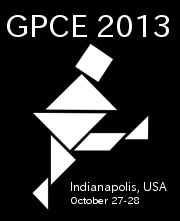 Please help us promote GPCE by including the following HTML code in your webpage, which will include the above image link to our website (you can change the width and height proportionally)
Please help us promote GPCE by including the following HTML code in your webpage, which will include the above image link to our website (you can change the width and height proportionally)
<a href="https://program-transformation.org/GPCE14">
<img title="Generative Programming and Component Engineering 2014" src="https://program-transformation.org/pub/GPCE13/Banner/GPCE-2013.png" alt="GPCE2013" width="180" height="266"/>
</a>
 13th International Conference on Generative Programming: Concepts & Experiences (GPCE'14)
13th International Conference on Generative Programming: Concepts & Experiences (GPCE'14)
 Collocated with ASE 2014 and SLE 2014
Collocated with ASE 2014 and SLE 2014Keynote by Nikolai Tillmann September 15-16, 2014
Västerås, Sweden
Sponsored by SIGPLAN. GPCE'14 proceedings published by ACM.

|

|

|
|
Important Dates
- Submission of papers: May 30, 2014
- Author notification: July 7, 2014
Scope
Generative and component approaches and domain-specific abstractions are revolutionizing software development just as automation and componentization revolutionized manufacturing. Raising the level of abstraction in software specification has been a fundamental goal of the computing community for several decades. Key technologies for automating program development and lifting the abstraction level closer to the problem domain are Generative Programming for program synthesis, Domain-Specific Languages (DSLs) for compact problem-oriented programming notations, and corresponding Implementation Technologies aiming at modularity, correctness, reuse, and evolution. As the field matures Applications and Empirical Results are of increasing importance. The International Conference on Generative Programming: Concepts & Experiences (GPCE) is a venue for researchers and practitioners interested in techniques that use program generation, domain-specific languages, and component deployment to increase programmer productivity, improve software quality, and shorten the time-to-market of software products. In addition to exploring cutting-edge techniques of generative software, our goal is to foster further cross-fertilization between the software engineering and the programming languages research communities.Topics
GPCE seeks contributions on all topics related to generative software and its properties. As technology is maturing, this year, we are particularly looking for empirical evaluations in this context. Key topics include (but are certainly not limited too):- Generative software
- Domain-specific languages
(language extension, language embedding, language design, language theory, language workbenches, interpreters, compilers) - Product lines
(domain engineering, feature-oriented and aspect-oriented programming, preprocessors, feature interactions) - Metaprogramming
(reflection, staging, partial evaluation) - Program synthesis
- Implementation techniques and tool support
(components, plug-ins, libraries, metaprogramming, macros, templates, generic programming, run-time code generation, model-driven development, composition tools, code-completion and code-recommendation systems)
- Domain-specific languages
- Properties of generative software
- Correctness of generators and generated code
(analysis, testing, formal methods, domain-specific error messages, safety, security) - Reuse and evolution
- Modularity, separation of concerns, understandability, and maintainability
- Performance engineering, nonfunctional properties
(program optimization and parallelization, GPGPUs, multicore, footprint, metrics) - Application areas and engineering practice
(distributed systems, middleware, embedded systems, patterns, development methods)
- Correctness of generators and generated code
- Empirical evaluations of all topics above
(user studies, substantial case studies, controlled experiments, surveys, rigorous measurements)
- Synthesizing code from declarative specifications
- Supporting extensible languages and language embedding
- Ensuring correctness and other nonfunctional properties of generated code; proving generators correct
- Improving error reporting with domain-specific error messages
- Reasoning about generators; handling variability-induced complexity in product lines
- Providing efficient interpreters and execution languages
- Human factors in developing and maintaining generators
Submissions
The submission site is http://www.easychair.org/conferences/?conf=gpce14.Research papers
10 pages in SIGPLAN proceedings style (sigplanconf.cls, default font size, see http://www.sigplan.org/authorInformation.htm) reporting original and unpublished results of theoretical, empirical, conceptual, or experimental research that contribute to scientific knowledge in the areas listed below (the PC chair can advise on appropriateness). Authors may choose to submit a paper as short paper of 4 pages or less. The goal of short papers is to promote current work on research and practice. Short papers represent an early communication of research and do not always require complete results as in the case of a full paper. In this way, authors can introduce new ideas to the community, discuss ideas and get early feedback. Please note that short papers are not intended to be position statements. Short papers are included in the proceedings and will be presented with a shorter time slot at the conference. Papers will be administratively rejected and will not be reviewed if they exceed the page limit or use condensed formatting.Tool demonstrations
Tool demonstrations should present tools that implement generative techniques, and are available for use. Any of the GPCE topics of interest are appropriate areas for tool demonstrations, although purely commercial tool demonstrations will not be accepted. Submissions have must provide a tool description of 4 pages in SIGPLAN proceedings style (see above) and a demonstration outline including screenshots of up to 4 pages. Tool demonstrations must have the words “Tool Demo” or “Tool Demonstration” in the title, possibly appended in parenthesis. The 4-page tool description will, if the demonstration is accepted, be published in the proceedings. The 4-page demonstration outline will be used by the program committee only for evaluating the submission.Tech talks
Depending on whether there is space in the program, GPCE may solicit Tech talks. See the GPCE'12 tech talks call for contributions for details. For now, if you are interested in presenting a Tech talk, please contact the chairs (chairs@gpce.org).Workshops
Workshops will be organized by ASE. Please inform us (chairs@gpce.org) and contact the ASE organizers if you would like to organize a workshop of interest to the GPCE audience.Organization and Committees
see ConferenceOrganizationCALL FOR TECH TALKS
 13th International Conference on Generative Programming: Concepts & Experiences (GPCE'14)
13th International Conference on Generative Programming: Concepts & Experiences (GPCE'14)
 Collocated with ASE 2014 and SLE 2014
Collocated with ASE 2014 and SLE 2014Keynote by Nikolai Tillmann September 15-16, 2014
Västerås, Sweden
Sponsored by SIGPLAN. GPCE'14 proceedings published by ACM.

|

|

|
|
Important dates
- Submission of tech talk proposals: July 2013
- Author notification: August 2013
Scope
Tech talks will be about an hour in length; longer than a regular conference talk, but shorter than the customary half or full day tutorials at other conferences. In contrast to research talks, tech talks do not have to present original new research material, but should rather focus on putting research into perspective for a broader audience. In contrast to longer tutorials, these talks cannot be very interactive or rely on the audience participating by using tools. Rather, they should aim to be 'keynote' style presentations, emphasizing the essence (but not avoiding depth). They can be thought of as distilled tutorials that provide a focused and in-depth treatment of specific research results considered relevant to the GPCE community. Moreover, the tech talks are included in the conference registration and are not charged separately. We hope that this will ensure high impact of the tech talks.Submission
If you are interested in presenting a tech talk at GPCE, please send a short proposal (about two pages) to the conference chairs (chairs@gpce.org) by July 2013. The proposal should consist of- title
- name of presenter
- abstract (max. 250 words)
- biography (max. 250 words)
- relevance for GPCE audience (max. 250 words)
- outline of tech talk (max. 1 page)
 13th International Conference on Generative Programming: Concepts & Experiences (GPCE'14)
13th International Conference on Generative Programming: Concepts & Experiences (GPCE'14)
 Collocated with ASE 2014 and SLE 2014
Collocated with ASE 2014 and SLE 2014Keynote by Nikolai Tillmann September 15-16, 2014
Västerås, Sweden
Sponsored by SIGPLAN. GPCE'14 proceedings published by ACM.

|

|

|
|
- Ulrik Pagh Schultz (University of Southern Denmark, DK)
- Matthew Flatt (University of Utah, USA)
- Ivica Crnkovic (Mälardalen University, SE)
- Kenichi Asai (Ochanomizu University, JP)
- Emilie Balland (INRIA, FR)
- Edwin Brady (University of St Andrews, UK)
- Dave Clarke (Uppsala University, SE and KU Leuven, BE)
- Ewen Denney (SGT / NASA, US)
- Sebastian Erdweg (Technische Universität Darmstadt, DE)
- Martin Erwig (Oregon State University, US)
- Alessandro Garcia (Pontifícia Universidade Católica do Rio de Janeiro, BR)
- Anirüddhā Gokhālé (Vanderbilt University, US)
- Jeff Gray (University of Alabama, US)
- Stefan Hanenberg (Universität Duisburg-Essen, DE)
- Jaakko Järvi (Texas A&M University, US)
- Jean-Marc Jézéquel (IRISA-University of Rennes, FR)
- Emerson Murphy-Hill (North Carolina State University, US)
- Nathaniel Nystrom (University of Lugano, CH)
- Bruno C. d. S. Oliveira (Hong Kong University, HK)
- Hridesh Rajan (Iowa State University, US)
- Márcio Ribeiro (Universidade Federal de Alagoas, BR)
- Tiark Rompf (Oracle Labs and EPFL, CH)
- Grigore Rosu (University of Illinois at Urbana-Champaign, US)
- Norbert Siegmund (Universität Passau, DE)
- Christian Skalka (University of Vermont, US)
- Scott Smith (Johns Hopkins University, US)
- Éric Tanter (Universidad de Chile, CL)
- Emina Torlak (University of California Berkeley, US)
- Laurence Tratt (King's College, UK)
- Sebastian Erdweg (Technical University of Darmstadt, DE)
- Bernd Fischer (SA) (2011-)
- Ewen Denney (USA) (2012-)
- Matthew Flatt (USA) (2014-)
- Jaakko Jarvi (USA) (2010-)
- Christian Kästner (USA) (2013-)
- Ulrik Pagh Schultz (DK) (2012-)
- Eelco Visser (NL), Chair (2008-2012, ex-officio member 2012-)
September 14, 2013
FOSD WorkshopSeptember 15, 2013
Welcome and Keynote
- 08:30-09:00 Welcome and Introduction
- 09:00-10:00 SLE Keynote: From Language Engineering to Viewpoint Engineering Colin Atkinson
Session 1: Specialization and Modularity (session chair: Ulrik Pagh Schultz)
- 10:30-11:00 Specializing Planners for Hierarchical Multi-Way Dataflow Constraint Systems Jaakko Järvi, Gabriel Foust and Magne Haveraaen
- 11:00-11:20 Code Specialization for Memory Efficient Hash-Tries (short paper) Michael Steindorfer and Jurgen Vinju
- 11:20-11:50 Emergent Gummy Modules: Modular Representation of Emergent Behavior Somayeh Malakuti and Mehmet Aksit
- 11:50-12:10 Extensible Language Implementation with Object Algebras (short paper) Maria Gouseti, Chiel Peters and Tijs Van Der Storm
Session 2: Variation and Product Lines (session chair: Matthew Flatt)
- 14:00-14:30 Projectional Editing of Variational Software Eric Walkingshaw and Klaus Ostermann — Best Paper Award
- 14:30-15:00 Automatic Feature Selection in Large-Scale System-Software Product Lines Andreas Ruprecht, Bernhard Heinloth and Daniel Lohmann
- 15:00-15:20 Efficient Testing of Software Product Lines via Centralization (short paper) Lei Ma, Cyrille Artho, Cheng Zhang and Hiroyuki Sato
Session 3: DSLs (session chair: Sebastian Erdweg)
- 16:00-16:30 A Transformational Approach to Data Visualization Karl Smeltzer, Martin Erwig and Ronald Metoyer
- 16:30-17:00 LibDSL: A Library for Developing Embedded Domain Specific Languages in D via Template Metaprogramming Masato Shioda, Hideya Iwasaki and Shigeyuki Sato
- 17:00-17:30 Yin-Yang: Concealing the Deep Embedding of DSLs Vojin Jovanovic, Amir Shaikhha, Sandro Stucki, Vladimir Nikolaev, Christoph Koch and Martin Odersky
September 16, 2013
Keynote
- 09:00-10:00 GPCE Keynote: Programming Cloud-connected Mobile Devices Nikolai Tillmann
Session 4: Specialization and Cross-Cutting (session chair: Kenichi Asai)
- 10:30-11:00 Automatic Locality-Friendly Interface Extension of Numerical Function Benjamin Hess, Markus Pueschel and Thomas Gross
- 11:00-11:30 Optimization by Runtime Specialization for Sparse Matrix-Vector Multiplication Sam Kamin, Maria Garzaran, Baris Aktemur, Danqing Xu, Buse Yilmaz and Zhongbo Chen
- 11:30-12:00 Specialization through Dynamic Staging Piotr Danilewski, Marcel Köster, Roland Leißa, Richard Membarth and Philipp Slusallek
Session 5: Language Tools (session chair: Jaakko Järvi)
- 14:00-14:30 Compiling a Reflective Language Using
MetaOCaml Kenichi Asai - 14:30-15:00 A Domain-Specific Language for Building Self-Optimizing AST Interpreters Christian Humer, Christian Wimmer, Christian Wirth, Andreas Woess and Thomas Wuerthinger
- 15:00-15:30 Pin++: A Object-oriented Framework for Writing Pintools James Hill and Dennis Feiock
Session 6:
- 16:00-17:00 Building mbeddr: a Language Engineering Experiment (tech talk) Markus Völter
- 17:00-17:15 Closing remarks
GPCE 2013 will be held at Västerås, Sweden, co-located with ASE 2014.
- Submission of papers: May 30, 2014 (Anywhere on Earth)
For papers submitted by the deadline, updates will be allowed through June 2, 2014 (Anywhere on Earth) - Paper notification: July 7, 2014
- Camera ready papers: August 7, 2014
- Conference: September 15-16, 2014
Biography
Christian Kästner is a researcher in the Programming Languages Group at the Philipps University Marburg, Germany. He received his Ph.D. in Computer Science in 2010 from the University of Magdeburg, Germany for his work on virtual separation of concerns, which included developing a variability-aware type system for software product lines. His research focuses on correctness and understanding of systems with variability, including work on implementation mechanisms, tools, different kinds of analyses, feature interactions, and variability mining and refactoring. He is the author or coauthor of over a fifty peer-reviewed scientific publications. Sven Apel is the leader of the Software Product-Line Group funded by the esteemed Emmy Noether Programme of the German Research Foundation (DFG). The group resides at the University of Passau, Germany. Dr.-Ing. Sven Apel received his Ph. D. in Computer Science in 2007 from the University of Magdeburg, Germany. His research interests include novel programming paradigms, software engineering and product lines, and formal and empirical methods. He is the author or coauthor of over a hundred peer-reviewed scientific publications. Sven Apel has been a program committee member of several highly ranked international conferences. His work received awards by the Ernst Denert Foundation and the Karin Witte FoundationJoint GPCE/SLE Keynote
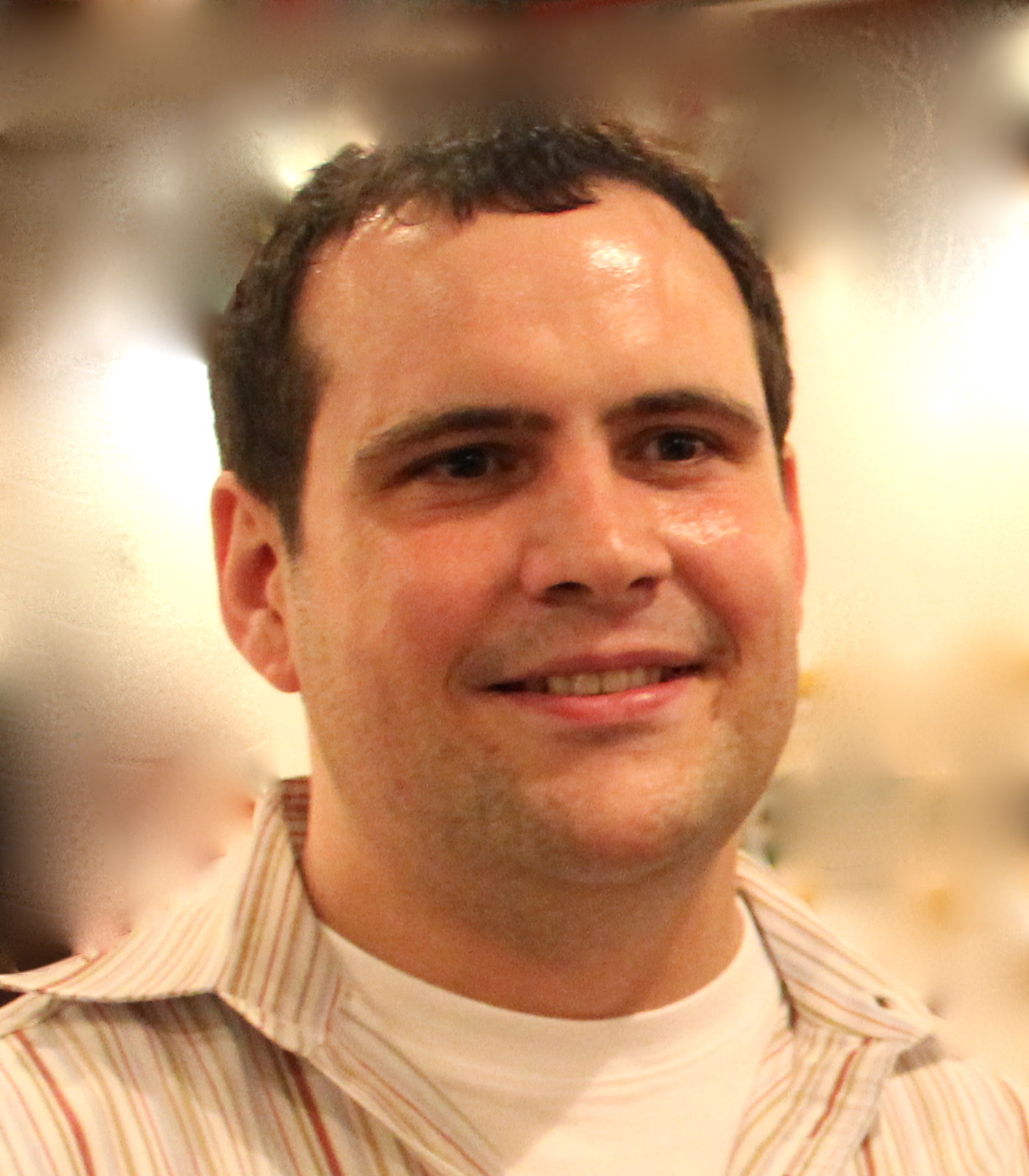 |
Programming Cloud-connected Mobile DevicesNikolai Tillmann (Microsoft Research)We are experiencing a technology shift: Powerful and easy-to-use mobile devices like smartphones and tablets are becoming more prevalent than traditional PCs and laptops. Mobile devices are going to be the first and, in less developed countries, possibly the only computing devices which virtually all people will own and carry with them at all times. Such devices are connected to the cloud most of the time, providing a local view on distributed data. Are the programming languages, environments and paradigms that have served us well for decades the best possible fit for this new world of cloud-connected devices?
In this talk, I will present Nikolai Tillmann is a Principal Development Lead at Microsoft, Redmond. His main areas of research are program authoring on mobile devices, program analysis, testing, optimization, and verification. At Microsoft Research, he started TouchDevelop, a cross-platform development environment which enables end-users to write programs for mobile devices on mobile devices; try it for yourself at www.touchdevelop.com. He also leads the Pex project, a framework for runtime verification and automatic test case generation for .NET applications based on parameterized unit testing and dynamic symbolic execution. Try out Pex on the web at www.pexforfun.com, or play a coding game based on the Pex engine at www.codehunt.com. Nikolai has a Dipl. Inf. in Computer Science from TU Berlin, Germany. |
Joint GPCE/SLE Keynote
From Language Engineering to Viewpoint EngineeringColin Atkinson (University of Mannheim)As software systems increase in size and complexity, and are expected to cope with ever more quantities of information from ever more sources, there is an urgent and growing need for a more view-oriented approach to software engineering. Views allow stakeholders to see exactly the right information, at exactly the right time, in a way that best matches their capabilities and goals. However, this is only possible if the information is represented in the optimal languages (i.e. domain- and purpose-specific), with the necessary context information and the optimal manipulation/editing features - that is, if information is viewed from the optimal viewpoints. Rather than merely engineering languages, therefore, software engineers in the future will need to engineer viewpoints, which augment language definitions (e.g. meta-models, syntax ...) with context information (e.g. elision, location, perspective ...) and user-interaction information (e.g. editing pallets, view manipulation services ...). In this talk Colin Atkinson will outline the issues faced in supporting the flexible and efficient engineering of viewpoints and will present some key foundations of a fundamentally view-oriented approach to software engineering. Colin Atkinson has been the leader of the Software Engineering Group at the University of Mannheim since April 2003. Before that he has held positions at the University of Kaiserslautern, the Fraunhofer Institute for Experimental Software Engineering and the University of Houston - Clear Lake. His research interests are focused on the use of model-driven and component based approaches in the development of dependable and adaptable computing systems. He was a contributor to the original UML development process and is one of the original developers of the deep (multi-level) approach to conceptual modelling. He received his Ph.D. and M.Sc. in computer science from Imperial College, London, in 1990 and 1985 respectively, and his B.Sc. in Mathematical Physics from the University of Nottingham 1983. |
Biography
Oege de Moor is the CEO of Semmle Ltd. He started his career in programming in 1982 with the development of a word processor for Arabic and Hebrew. After an undergraduate degree in computer Science at Utrecht (the Netherlands), he did his graduate work at Oxford. At present he is a professor of computer science there, and a fellow of Magdalen College. He has held visiting appointments at Chalmers University (Sweden), the University of Tokyo (Japan), and Microsoft Research (Redmond and Cambridge).
Poster for display
(DIN A3)
(11.5in x 17.5in)
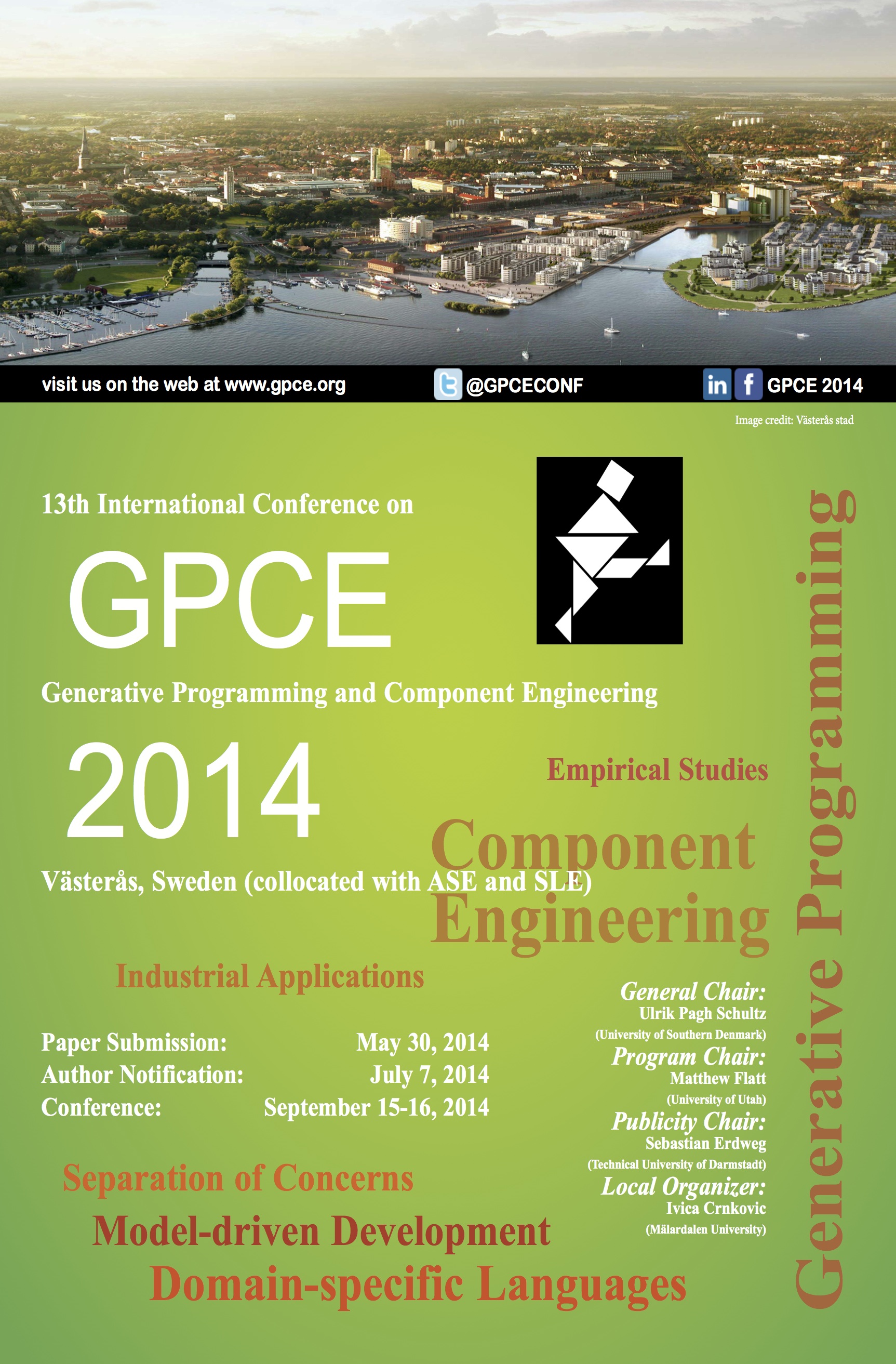
|
Flyer for hand out
(DIN A4)
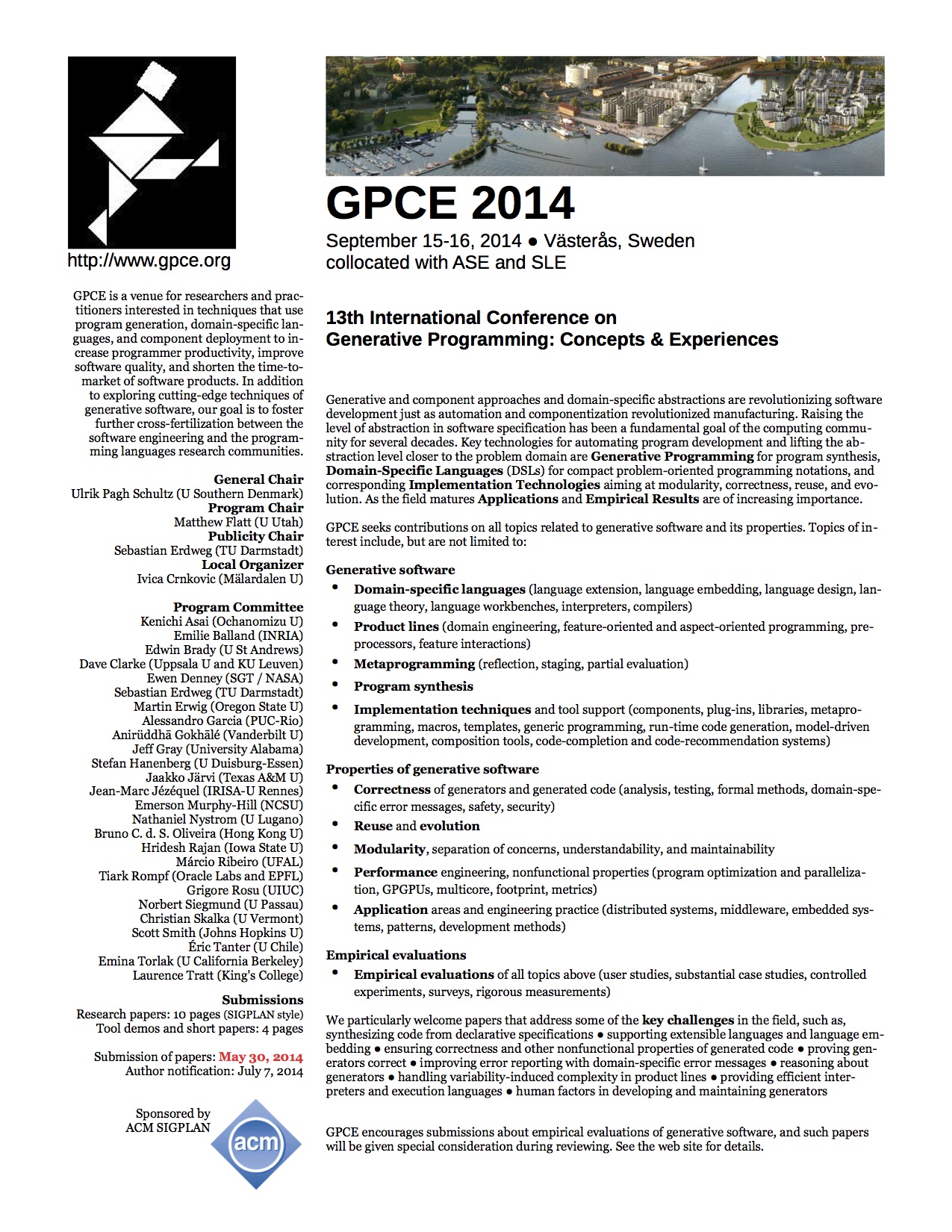
|

|

|

|
|
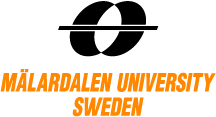
- AcceptedPapers
- Banner
- CallForPapers
- CallForTechTalks
- ConferenceHeader
- ConferenceOrganization
- ConferenceProgram
- ConferenceRegistration
- ConferenceVenue
- ContributorLogos
- GpceRegistration
- Grants
- ImportantDates
- KaestnerTechTalk
- KeynoteSpeakers
- MoorInvitedTalk
- P103Bauer
- P112Efftinge
- P11Thum
- P122Rafkind
- P132Walkingshaw
- P1Damiani
- P21Ryssel
- P31Rayside
- P41Hulette
- P50Axelsen
- P60Spacek
- P70Zhang
- P80Freeman
- P84Riche
- P93Bagheri
- Poster
- TanterInvitedTalk
- TechTalk
- Tutorial1ProjectFortress
- Tutorial2MegaMedeling
- Tutorial3EmbeddedDSLs
- Tutorial4AgileEfficientDSLs
- Tutorial5OntologiesAndSE
- Tutorial6MPS
- VenueAccomodation
- WebChanges
- WebCustomMenus
- WebHome
- WebIndex
- WebLeftBar
- WebNews
- WebNotify
- WebPreferences
- WebSearch
- WebStatistics
- WebTools
- Workshops
3 spaces * Main.yourWikiName - yourEmailAddress
- MyName? - myname@site.edu
TWiki.GPCE14 Web Preferences
The following settings are web preferences of the TWiki.GPCE14 web. These preferences overwrite the site-level preferences in TWikiPreferences, and can be overwritten by user preferences (your personal topic, i.e. TWikiGuest in the TWiki.Main web)- Set WEBTITLE = 2014 International Conference on Generative Programming: Concepts and Experiences
- Set SHORTWEBTITLE = GPCE 2014
- Set URLGPCE12 = http://gpce13.gpce.org
- Set GPCEDAYS = October 27-28, 2012
- Set GPCEDETAILDAYS = *Main Conference: Oct. 27-28, workshops and tutorials: *
- Set URLFLYER =
- Set URLFLYERALT = ?
- Set URLOOPSLA06 = ?
- Set URLLOCAL = ?
- Set URLPORTLAND = ?
- Set VENUE = ?
- Set VENUECITY = Indianapolis, IN, USA
- Set PROPOSALSUBMISSION = ?
- Set PROPOSALNOTIFICATION = ?
- Set TECHTALKSSUBMISSION = Monday, June 4, 2012; 23:55 Honolulu time
- Set TECHTALKSNOTIFICATION = Monday, June 18, 2012
- Set OLDPAPERPRESUBMISSION = Monday, May 16, 2011
- Set OLDPAPERSUBMISSION = Sunday, May 22, 2011
- Set PAPERPRESUBMISSION = Monday, April 23, 2012; 23:55 Honolulu time (hard deadline)
- Set PAPERSUBMISSION = Monday, April 30, 2012; 23:55 Honolulu time
- Set PAPERSUBMISSIONPOSTPONED = ?
- Set PAPERNOTIFICATION = Monday, June 4, 2012
- Set PAPERCAMERAREADY = Monday, July 9, 2012
- Set WORKSHOPSUBMISSION = *??, * (suggested)
- Set WORKSHOPNOTIFICATION = *??, * (suggested)
- Set WORKSHOPCAMERAREADY = *??, *
- Set TUTORIALCAMERAREADY = *??, *
- Set EARLYREGISTRATION = *??, *
- Set LATEREGISTRATION = *??, *
- Set WORKSHOPDAYS = ?
- Set GPCEVENUE = Gpce Venue
- Set WEBTITLE = Generative Programming: Concepts and Experiences
- Set SHORTWEBTITLE = GPCE 2014
- Web specific background color: (Pick a lighter one of the StandardColors)
- Set WEBBGCOLOR = #D0D0D0
- Exclude web from a
web="all"search: (Set toonfor hidden webs)- Set NOSEARCHALL =
- Default template for new topics and form(s) for this web:
- WebTopicEditTemplate?: Default template for new topics in this web. (Site-level is used if topic does not exist)
- TWiki.WebTopicEditTemplate: Site-level default template
- TWikiForms: How to enable form(s)
- Set WEBFORMS =
- Users or groups who are not / are allowed to view / change / rename topics in the GPCE14 web: (See TWikiAccessControl)
- Set DENYWEBVIEW =
- Set ALLOWWEBVIEW =
- Set DENYWEBCHANGE =
- Set ALLOWWEBCHANGE = GpceorgGroup
- Set DENYWEBRENAME =
- Set ALLOWWEBRENAME = GpceorgGroup
- Users or groups allowed to change or rename this WebPreferences topic: (I.e. TWikiAdminGroup)
- Set ALLOWTOPICCHANGE = TWikiAdminGroup GpceorgGroup
- Set ALLOWTOPICRENAME = TWikiAdminGroup GpceorgGroup
- Web preferences that are not allowed to be overridden by user preferences:
- Set FINALPREFERENCES = WEBTOPICLIST, DENYWEBVIEW, ALLOWWEBVIEW, DENYWEBCHANGE, ALLOWWEBCHANGE, DENYWEBRENAME, ALLOWWEBRENAME
- A preference is defined as:
6 spaces * Set NAME = value
Example:- Set WEBBGCOLOR = #FFFFC0
- Preferences are used as TWikiVariables by enclosing the name in percent signs. Example:
- When you write variable
%WEBBGCOLOR%, it gets expanded to#D0D0D0.
- When you write variable
- The sequential order of the preference settings is significant. Define preferences that use other preferences first, i.e. set
WEBCOPYRIGHTbeforeWIKIWEBMASTERsince%WEBCOPYRIGHT%uses the%WIKIWEBMASTER%variable. - You can introduce new preferences variables and use them in your topics and templates. There is no need to change the TWiki engine (Perl scripts).
- TWikiPreferences has site-level preferences.
- TWikiUsers has a list of user topics. User topics can have optional user preferences.
- TWikiVariables has a list of common
%VARIABLES%. - TWikiAccessControl explains how to restrict access by users or groups.
- Topic index: List of GPCE14 topics in alphabetical order.
|All|A|B|C|D|E|F|G|H|I|J|K|L|M|N|O|P|Q|R|S|T|U|V|W|X|Y|Z|
| All topics in BookView |
- Jump to topic: If you already know the name of the topic, enter the name of the topic into the GoBox at the top
- WebChanges: Find out what topics in GPCE14 have changed recently
- How to edit text:
- Make changes to topics in GoodStyle,
- Learn the TextFormattingRules, and
- Have a look at the TextFormattingFAQ
HistoricalStatistics? for TWiki.GPCE14 Web
| Month: | Topic views: | Topic saves: | File uploads: | Most popular topic views: | Top contributors for topic save and uploads: |
|---|---|---|---|---|---|
| Feb 2008 | 2643 | 0 | 0 | 512 WebStatistics 302 WebHome 103 WebPreferences 102 WebNews 102 PEPMPublicity? 102 PEPMProgram? 75 ProgramCommittee? 70 CallForPapers 63 PaperSubmission? 63 ImportantDates 63 PreviousMeetings? | |
| Jan 2008 | 9554 | 0 | 0 | 1433 WebHome 786 WebStatistics 660 PEPMProgram? 433 ProgramCommittee? 361 PEPMPublicity? 291 WebNews 283 PreviousMeetings? 283 RegistrationAndAccomodation? 265 PaperSubmission? 265 ImportantDates 260 InvitedTalks? | |
| Dec 2007 | 7197 | 33 | 0 | 1314 WebHome 573 PEPMProgram? 329 WebStatistics 304 ProgramCommittee? 267 WebNews 254 PEPMPublicity? 233 AcceptedPapers 213 PaperSubmission? 204 InvitedTalks? 201 RegistrationAndAccomodation? 195 PreviousMeetings? | 32 RobertGlueck 1 OegeDeMoor |
| Nov 2007 | 8164 | 17 | 0 | 1673 WebHome 430 WebStatistics 374 AcceptedPapers 344 ImportantDates 335 ProgramCommittee? 300 WebNews 275 PEPMProgram? 267 RegistrationAndAccomodation? 266 PaperSubmission? 255 InvitedTalks? 247 PEPMPublicity? | 17 RobertGlueck |
| Oct 2007 | 8900 | 21 | 1 | 2412 WebHome 822 PaperSubmission? 709 ImportantDates 565 CallForPapers 440 ProgramCommittee? 369 ResearchPaperAdvice? 232 ToolPaperAdvice? 217 PEPMPublicity? 197 InvitedTalks? 196 WebNews 196 PreviousMeetings? | 22 RobertGlueck |
| Sep 2007 | 7368 | 3 | 0 | 1582 WebHome 443 CallForPapers 404 ImportantDates 375 PaperSubmission? 358 ProgramCommittee? 332 WebStatistics 254 PEPMPublicity? 236 PreviousMeetings? 228 ResearchPaperAdvice? 200 InvitedTalks? 198 RegistrationAndAccomodation? | 3 RobertGlueck |
| Aug 2007 | 12282 | 74 | 10 | 2082 WebHome 833 ProgramCommittee? 744 WebStatistics 741 CallForPapers 573 ImportantDates 513 PEPMPublicity? 433 PaperSubmission? 416 PEPMProgram? 409 PreviousMeetings? 383 ResearchPaperAdvice? 341 ConferenceOrganization | 81 RobertGlueck 3 OegeDeMoor |
| Jul 2007 | 3115 | 144 | 0 | 405 WebHome 216 ProgramCommittee? 159 PreviousMeetings? 154 CallForPapers 150 WebStatistics 132 ImportantDates 117 PEPMNews? 112 WebIndex 99 PEPMPublicity? 96 ConferenceOrganization 80 ResearchPaperAdvice? | 144 RobertGlueck |
| Jun 2007 | 5518 | 0 | 0 | 673 WebHome 316 WebStatistics 235 PEPMProgram? 172 PreviousMeetings? 154 WebNews 153 WorkshopVenue? 146 ProgramCommittee? 142 PaperSubmission? 134 PEPMPublicity? 131 AffiliatedMeetings? 130 AcceptedPapers | |
| May 2007 | 4489 | 0 | 0 | 530 WebHome 524 WebStatistics 202 PEPMProgram? 126 PEPMPublicity? 116 WebNews 115 PreviousMeetings? 113 ProgramCommittee? 110 PaperSubmission? 107 RegistrationAndAccomodation? 98 AffiliatedMeetings? 98 WorkshopVenue? | |
| Apr 2007 | 4460 | 0 | 0 | 606 WebHome 358 WebStatistics 172 PEPMProgram? 135 ProgramCommittee? 121 WebNews 121 PEPMPublicity? 121 ToolPaperAdvice? 119 PreviousMeetings? 115 CallForPapers 109 PaperSubmission? 105 WebChanges | |
| Mar 2007 | 4825 | 0 | 0 | 593 WebHome 454 WebStatistics 202 PEPMProgram? 152 ProgramCommittee? 128 WebNews 118 PublicityList06? 116 PaperSubmission? 110 AffiliatedMeetings? 109 ResearchPaperAdvice? 108 WebChanges 103 PreviousMeetings? | |
| Feb 2007 | 4464 | 0 | 0 | 661 WebHome 344 WebStatistics 261 PEPMProgram? 158 WebNews 158 ProgramCommittee? 128 PaperSubmission? 123 AffiliatedMeetings? 119 ResearchPaperAdvice? 118 CallForPapers 116 PEPMPublicity? 108 ToolPaperAdvice? | |
| Jan 2007 | 5169 | 7 | 0 | 1040 WebHome 612 WebStatistics 462 PEPMProgram? 188 ProgramCommittee? 148 WebNews 133 PEPMPublicity? 123 AffiliatedMeetings? 114 CallForPapers 113 AcceptedPapers 112 PaperSubmission? 111 ResearchPaperAdvice? | 7 EelcoVisser |
| Dec 2006 | 4452 | 17 | 0 | 1122 WebHome 398 PEPMProgram? 164 ProgramCommittee? 140 AcceptedPapers 134 RegistrationAndAccomodation? 126 ResearchPaperAdvice? 118 WebStatistics 115 ImportantDates 114 CallForPapers 101 WebNews 98 ToolPaperAdvice? | 17 EelcoVisser |
| Nov 2006 | 3436 | 5 | 0 | 782 WebHome 223 WebStatistics 154 ProgramCommittee? 141 ImportantDates 136 ResearchPaperAdvice? 125 CallForPapers 106 ToolPaperAdvice? 97 PEPMProgram? 88 AffiliatedMeetings? 88 InvitedTalks? 83 PEPMPublicity? | 5 EelcoVisser |
| Oct 2006 | 3880 | 8 | 0 | 1065 WebHome 262 ImportantDates 252 CallForPapers 201 PaperSubmission? 162 ProgramCommittee? 134 ResearchPaperAdvice? 121 WebStatistics 111 PEPMPublicity? 101 PreviousMeetings? 91 ToolPaperAdvice? 91 AffiliatedMeetings? | 8 EelcoVisser |
| Sep 2006 | 2926 | 5 | 0 | 650 WebHome 176 CallForPapers 146 ImportantDates 136 WebStatistics 116 ProgramCommittee? 95 ResearchPaperAdvice? 82 PEPMPublicity? 76 InvitedTalks? 72 PaperSubmission? 69 PreviousMeetings? 67 ToolPaperAdvice? | 5 EelcoVisser |
| Aug 2006 | 4938 | 0 | 0 | 786 WebHome 268 CallForPapers 213 WebStatistics 195 ProgramCommittee? 176 PaperSubmission? 171 WebChanges 155 ImportantDates 151 PEPMPublicity? 148 PreviousMeetings? 131 WebNotify 124 PEPMProgram? | |
| Jul 2006 | 7014 | 0 | 0 | 868 WebHome 350 ProgramCommittee? 337 WebStatistics 334 CallForPapers 235 PaperSubmission? 213 PreviousMeetings? 206 PEPMPublicity? 194 ImportantDates 189 WebChanges 180 WebNotify 175 RegistrationAndAccomodation? | |
| Jun 2006 | 4150 | 29 | 2 | 827 WebHome 261 CallForPapers 233 ProgramCommittee? 164 WebStatistics 159 ImportantDates 136 PreviousMeetings? 125 ResearchPaperAdvice? 119 PaperSubmission? 116 WebChanges 114 PEPMPublicity? 104 RegistrationAndAccomodation? | 31 EelcoVisser |
| May 2006 | 2620 | 80 | 0 | 427 WebHome 138 ProgramCommittee? 138 CallForPapers 103 PreviousMeetings? 103 ImportantDates 78 WorkshopVenue? 77 ResearchPaperAdvice? 74 WebChanges 72 WebLeftBar 69 WebNotify 69 AffiliatedMeetings? | 80 EelcoVisser |
| Apr 2006 | 15023 | 8 | 0 | 3330 WebHome 1250 CallForPapers 781 WebStatistics 571 ImportantDates 504 ConferenceOrganization 486 CallForTechTalks 468 CallForDemonstrations? 443 CallForWorkshops? 414 WebNews 397 ElectronicSubmission? 393 WebChanges | 8 ToddVeldhuizen |
| Mar 2006 | 10528 | 1 | 0 | 2345 WebHome 871 CallForPapers 667 WebStatistics 376 ImportantDates 343 CallForTechTalks 325 CallForWorkshops? 325 ConferenceOrganization 310 WebNews 263 CallForDemonstrations? 255 WebChanges 244 WebPreferences | 1 EelcoVisser |
| Feb 2006 | 6534 | 0 | 0 | 1541 WebHome 550 CallForPapers 397 WebStatistics 258 ImportantDates 235 CallForTechTalks 226 ConferenceOrganization 215 CallForDemonstrations? 212 CallForWorkshops? 200 WebNews 139 WebLeftBar 129 WebPreferences | |
| Jan 2006 | 6593 | 129 | 5 | 1553 WebHome 494 CallForPapers 422 WebStatistics 315 ImportantDates 240 WebNews 223 ConferenceOrganization 219 CallForTechTalks 197 WebPreferences 191 CallForWorkshops? 187 WebLeftBar 152 WebChanges | 116 EmirPasalic 17 ToddVeldhuizen 1 ChristaSchwanninger |
| Dec 2005 | 5873 | 38 | 0 | 1603 WebHome 535 WebStatistics 292 WebNews 246 CallForPapers 230 WebLeftBar 204 WebPreferences 194 ImportantDates 179 ConferenceHeader 166 WebIndex 160 CallForTechTalks 156 PEPMNews? | 37 EmirPasalic 1 ChristaSchwanninger |
| Nov 2005 | 3943 | 0 | 0 | 868 WebStatistics 849 WebHome 147 WebLeftBar 144 WebNews 127 ImportantDates 126 WebPreferences 116 WebChanges 114 CallForPapers 109 ConferenceOrganization 105 WebNotify 92 PEPMNews? | |
| Oct 2005 | 3209 | 33 | 0 | 932 WebHome 175 WebNews 127 WebChanges 126 WebPreferences 118 PEPMNews? 115 WebLeftBar 111 ImportantDates 110 WebNotify 105 WebStatistics 101 ConferenceHeader 99 WebIndex | 31 ChristaSchwanninger 2 EugenioMoggi |
| Sep 2005 | 1290 | 18 | 2 | 361 WebHome 73 WebNews 55 WebIndex 46 WebNotify 46 WebChanges 41 PEPMNews? 39 WebChanges500? 38 WebSearch 38 CallForPapers 37 WebPreferences 36 WebChanges100? | 17 EelcoVisser 3 PradeepikaIrangani |
| Aug 2005 | 1526 | 32 | 1 | 481 WebHome 147 WebStatistics 94 ConferenceHeader 86 WebIndex 84 WebNews 75 WebPreferences 69 WebChanges 59 PEPMNews? 51 WebNotify 49 WebLeftBar 43 WebSearch | 20 EelcoVisser 7 MartinBravenboer 5 StanJarzabek 1 PradeepikaIrangani |
| Jul 2005 | 1191 | 0 | 0 | 389 WebHome 102 WebNews 74 WebIndex 73 WebChanges 68 WebStatistics 67 PEPMNews? 57 ConferenceHeader 52 WebSearch 50 WebNotify 50 WebChanges500? 49 WebChanges200? | |
| Jun 2005 | 923 | 0 | 0 | 375 WebHome 86 WebNews 68 WebStatistics 57 WebChanges 46 PEPMNews? 45 WebNotify 42 WebIndex 39 WebSearch 37 ConferenceHeader 26 WebLeftBar 24 WebChanges500? | |
| May 2005 | 848 | 7 | 0 | 371 WebHome 53 WebNews 51 WebStatistics 45 ConferenceHeader 42 PEPMNews? 38 WebChanges 33 WebIndex 31 WebSearch 26 WebPreferences 24 WebNotify 24 WebLeftBar | 7 EelcoVisser |
| Apr 2005 | 6648 | 36 | 0 | 2409 WebHome 975 CallForPapers 638 ElectronicSubmission? 298 GpceTutorialsAndWorkshops? 242 ImportantDates 181 ConferenceOrganization 148 CallForDemonstrations? 130 CallForWorkshops? 110 YoungResearchers? 102 GraphModelTransformations? 93 CallForTechTalks | 23 AndrewMalton 10 EugenioMoggi 2 RobertGlueck 1 EelcoVisser |
| Mar 2005 | 4848 | 35 | 1 | 2091 WebHome 696 CallForPapers 202 ImportantDates 178 ElectronicSubmission? 153 ConferenceOrganization 152 CallForDemonstrations? 132 CallForWorkshops? 131 GpceTutorialsAndWorkshops? 106 CallForTechTalks 55 PEPMNews? 52 WebIndex | 29 EugenioMoggi 5 RobertGlueck 2 EelcoVisser |
| Feb 2005 | 2975 | 7 | 0 | 1164 WebHome 364 CallForPapers 140 ImportantDates 137 ConferenceOrganization 95 CallForWorkshops? 84 CallForDemonstrations? 72 CallForTechTalks 50 PEPMNews? 39 WebNews 39 WebChanges 38 WebNotify | 7 EugenioMoggi |
| Jan 2005 | 2719 | 19 | 0 | 1375 WebHome 211 CallForPapers 169 ConferenceOrganization 135 ImportantDates 98 CallForWorkshops? 74 CallForTechTalks 59 PEPMNews? 45 WebIndex 42 WebChanges 35 WebNews 30 CallForDemonstrations? | 12 EugenioMoggi 7 EelcoVisser |
| Dec 2004 | 1546 | 68 | 0 | 707 WebHome 125 ImportantDates 92 ConferenceOrganization 67 ConferenceVenue 60 CallForWorkshops? 37 WebIndex 36 CallForTechTalks 34 WebPreferences 33 WebNews 32 PEPMNews? 25 WebChanges | 43 EugenioMoggi 13 JeffGray 10 EelcoVisser 2 MartinBravenboer |
| Nov 2004 | 836 | 18 | 0 | 407 WebHome 77 ImportantDates 66 ConferenceOrganization 38 ConferenceVenue 31 PEPMNews 28 CallForPapers 25 WebNews 20 ForOrganizers? 19 WebIndex 9 CallForWorkshops? 8 ElectronicSubmission? | 11 EelcoVisser 7 EugenioMoggi |
| Oct 2004 | 400 | 30 | 0 | 206 WebHome 50 ConferenceOrganization 38 ImportantDates 27 ConferenceVenue 17 ConferenceHeader 14 WebIndex 11 WebContents? 5 PrintCall? 4 WebNews 4 CallForPapers 2 GpceTutorials? | 27 EugenioMoggi 2 MoggiE 1 RobertGlueck |
- Do not edit this topic, it is updated automatically. (You can also force an update)
- TWikiDocumentation tells you how to enable the automatic updates of the statistics.
- Suggestion: You could archive this topic once a year and delete the previous year's statistics from the table.
- WebNews: selected changes
- WebChanges: recent changes
- WebNotify: email notification of changes
- WebStatistics: usage counts
- WebPreferences: values of variables
- WebContents?: web specific entries in the side bar
